Male-factor infertility is seldom discussed. The impact? A surprising lack of awareness of the full range of factors that can affect male fertility.
We conducted a survey of nearly 3,000 respondents to identify the gaps in male fertility knowledge among the general population. And it turns out the absence of public knowledge on certain factors did not correspond with the actual impact it has on male fertility.
How does your knowledge stack up against our survey results? Read on to learn about some of the key factors that affect male-factor infertility you should be aware of.
Findings from the 2023 Sperm Report
- Legacy’s survey responses showed that most respondents couldn’t identify some of the major health, environment, and lifestyle factors affecting male fertility.
- Pop culture largely influences public awareness on factors that impact male-factor infertility and has led to some popular misconceptions.
- There are many actions you can take to protect and improve your fertility to counteract and account for the factors that affect male fertility.
Legacy’s survey
We talk a lot about all the factors that affect male fertility at Legacy, but we realize there is still a lack of awareness about these factors among the general public. We were curious to find out what people knew — and more importantly, what people didn’t know — about what affects male fertility.
In November 2022, we conducted a survey that asked individuals to identify the factors that impact male fertility. We received 2,983 responses from respondents between the ages of 18 and 65. Of the group, 50% identified as cisgender men, 48% as cisgender women, and 2% as trans or nonbinary.* These were our findings.
*Note: when we refer to “women” and “men,” we include all people who self-identify as such.
Most respondents couldn’t identify the factors affecting sperm health
It turns out many of us don’t realize the full extent to which certain lifestyle, occupational, and environmental choices impact fertility.
Varicocele and male fertility
Varicocele is a swelling of the veins in the testes. There are often no signs or symptoms, but it can lead to infertility. The cause of varicocele is unknown. One contributing factor could be valve malfunctions in the testicular veins, which causes the blood to get backed up. The blood pools, which leads to swollen veins.
Varicocele can have an adverse effect on sperm production, resulting in infertility. The main characteristics of varicocele that contribute to infertility include higher scrotal temperature, hormone imbalances, and increased intratesticular pressure.
In Legacy’s survey, less than 1 out of every 10 respondents were able to identify varicocele as a factor affecting male fertility. However, varicocele is present in around 40% of cases of male-factor infertility.
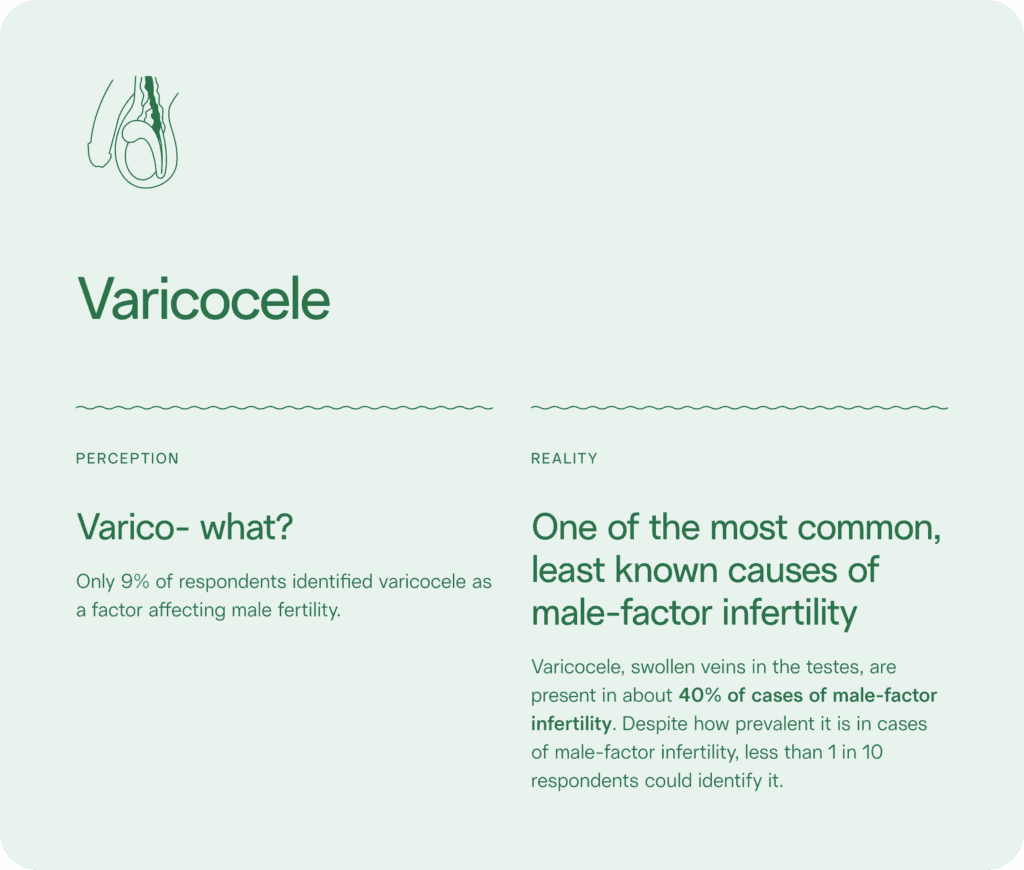
Occupation and male fertility
Many people do not realize their work can have a lasting impact on their fertility. Certain jobs involve exposure to chemicals or toxins. Others can lead to an increased risk of injury. In both cases, occupation is an important factor that can contribute to and significantly increase the chances of infertility.
Did you know veterans and members of the military are twice as likely to experience infertility compared to civilians? Similarly, careers in agriculture and manufacturing can lead to an increased risk of infertility.
From our survey, only 14% of respondents identified occupation as a factor affecting male fertility. The awareness among individuals in high-risk industries — military, agriculture, and manufacturing — was only slightly higher, at 17%.
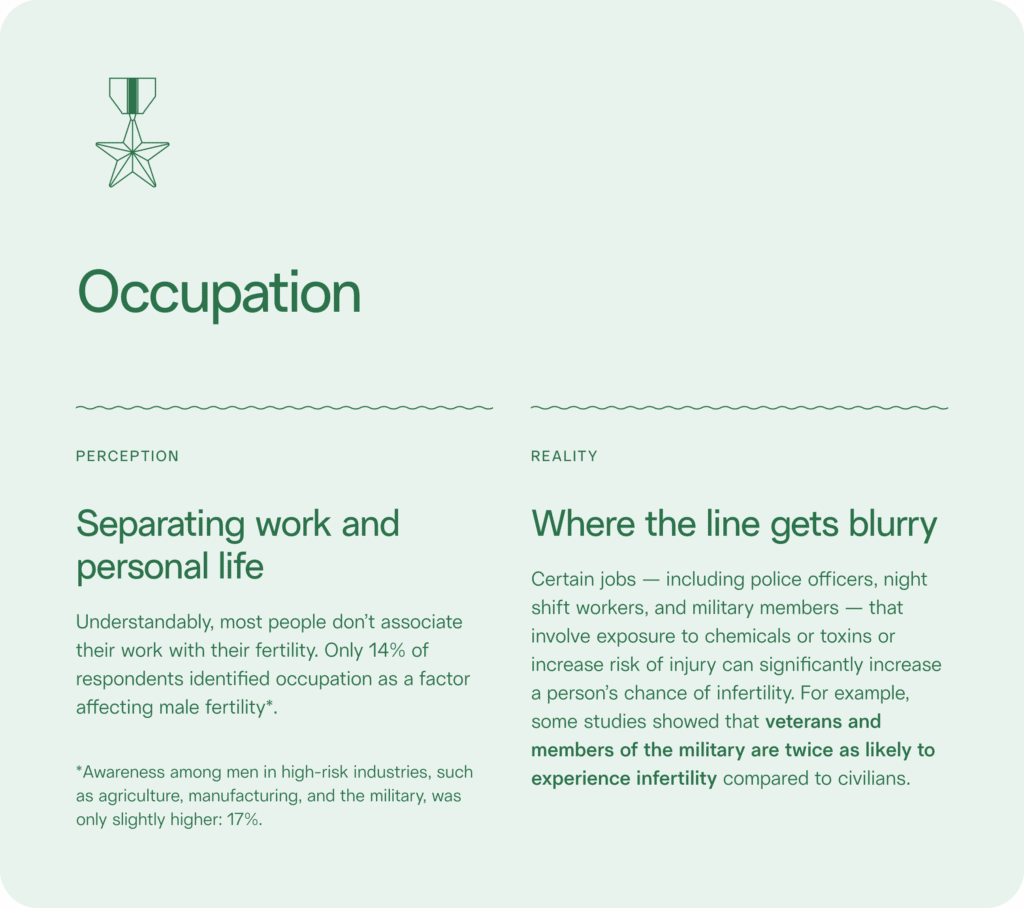
Pollution and male fertility
It may come as no surprise that our environment plays a significant role in our health and well-being. What is lesser known, however, is the connection between environmental factors, such as air quality, and fertility issues.
Research has shown that couples who are exposed to high levels of particulate matter in the air are nearly twice as likely to experience infertility. Chronic exposure to pollutants can result in reduced sperm concentration and motility, increased DNA damage, and impaired sperm production.
Our survey showed that 18% of respondents identified pollution as a factor that affects male fertility — a shockingly low percentage given the prevalence of air pollutants in many urban environments.
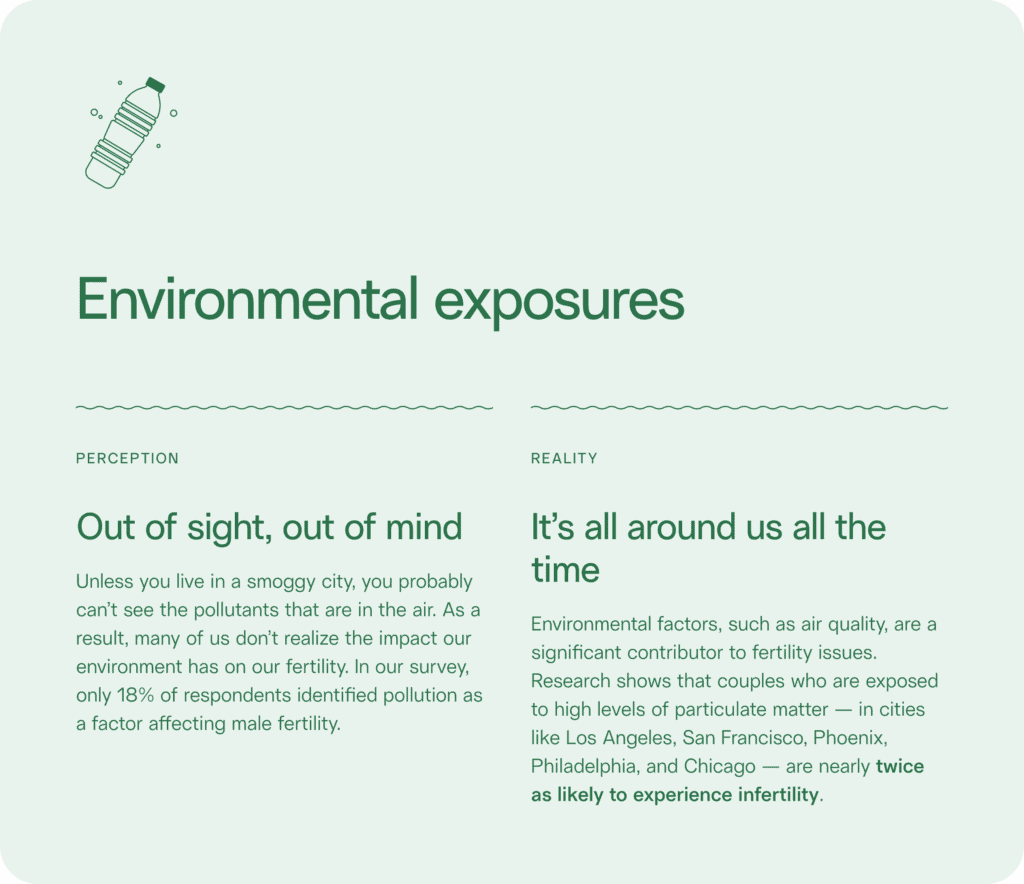
Sauna or hot tub use and male fertility
Taking a relaxing soak in the hot tub can be a nice way to warm up on a cool evening. What many people may not think about is the impact taking a soak can have on scrotal temperatures.
Sperm are sensitive to high temperatures and, as a result, spending time in hot tubs or saunas can lead to fertility issues. The ideal temperature for sperm production is around three to four degrees below body temperature. Continuous exposure to high temperatures — whether from sitting in a hot tub, placing a laptop on your lap, or wearing tight-fitting underwear — can result in lower sperm concentration and motility.
From our survey, 21% of respondents identified saunas and hot tub use as a factor that affects male fertility. Saunas and hot tubs overheat the scrotum and can potentially affect sperm production for months after use.
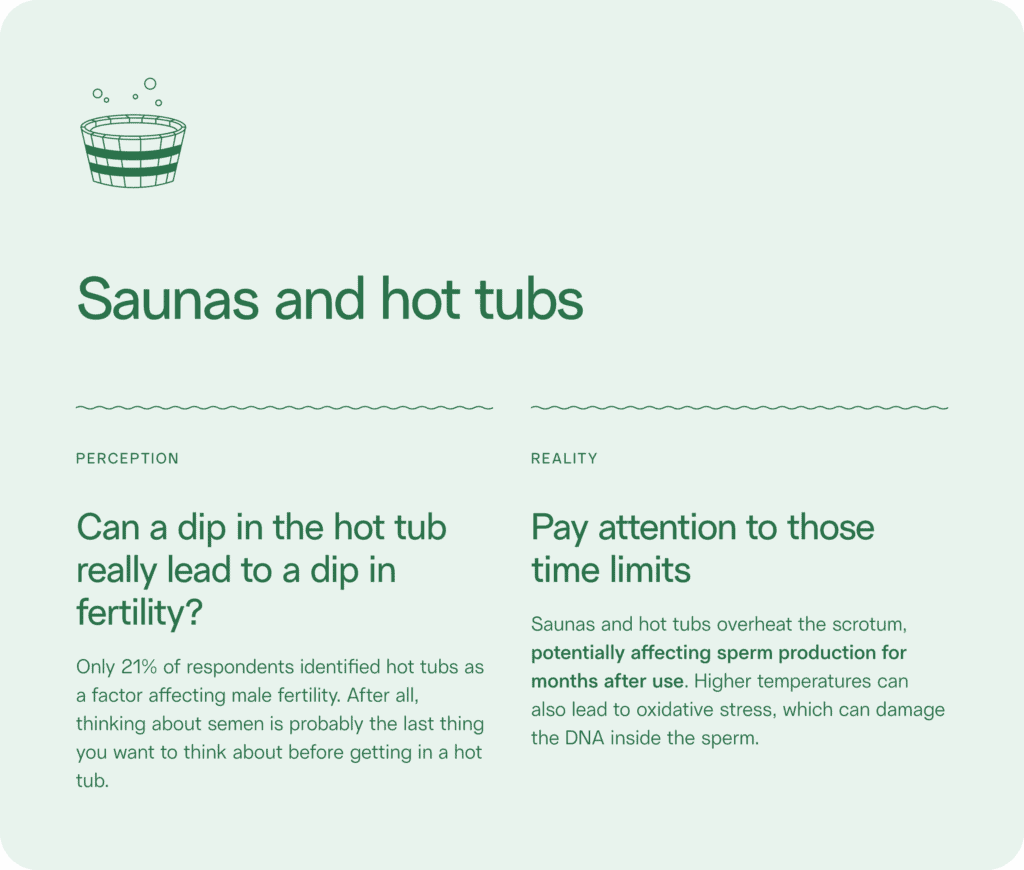
Smoking and male fertility
Smoking cigarettes can have a lasting effect on lung health, dental health, and, as it turns out, reproductive health. The American Society for Reproductive Medicine considers cigarette smoking one of the leading risk factors for infertility.
Men who smoke are about twice as likely to experience infertility compared to non-smokers. Smoking can have a detrimental impact on semen volume, sperm count, and sperm motility. In one study of 1,786 men, smoking was associated with a 17.5% decline in sperm count compared to the non-smokers.
In our survey, we found that less than half — 46% — of respondents could identify smoking as a factor that affects male fertility. Given the robust research that indicates a strong link between smoking and reduced male fertility, the best option if trying to conceive is to quit smoking. Luckily, sperm health can recover in as little as six months of quitting.
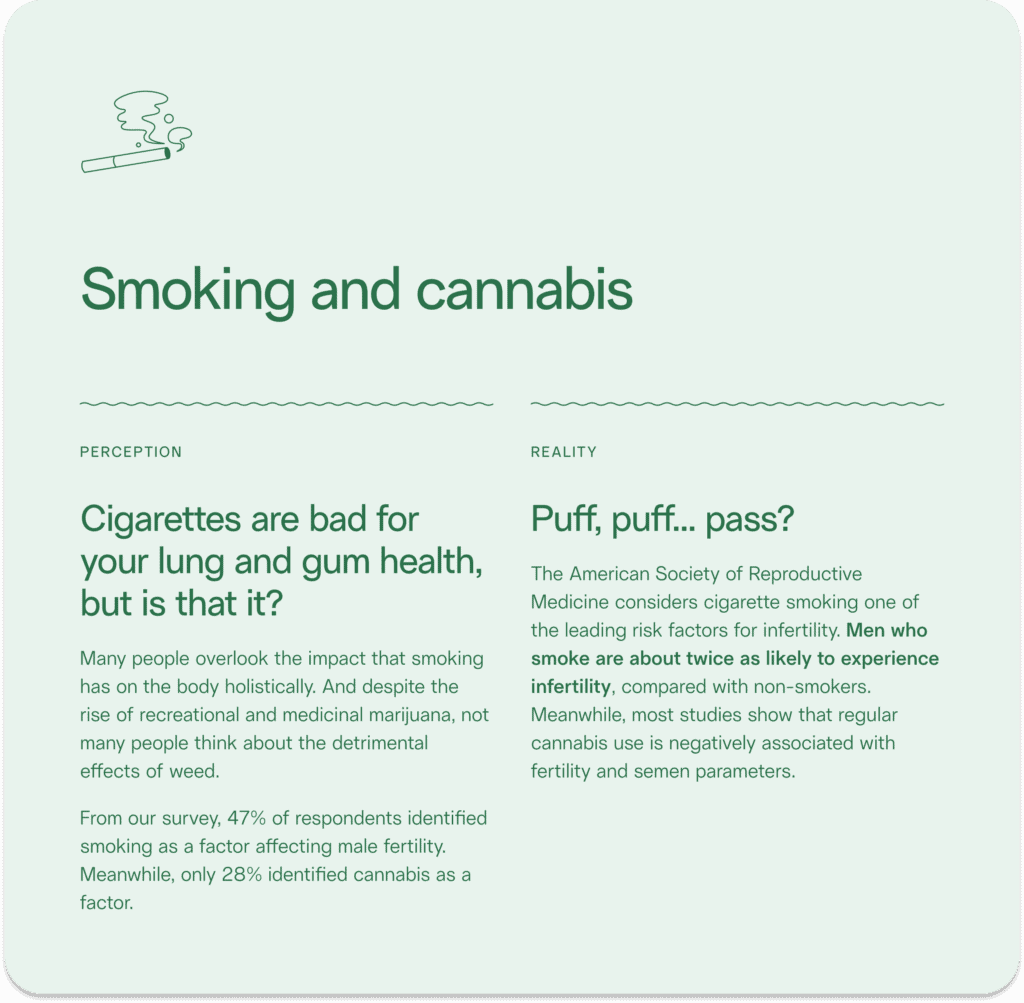
Testosterone therapy and male fertility
Testosterone therapy may be recommended for cisgender men with abnormally low testosterone levels (or transgender men seeking gender-affirming hormone therapy).
Testosterone is just one of the hormones that affects male fertility, and only a small amount is actually required for sperm production. As a result, it is possible for cis men to have low testosterone levels without facing infertility. Contrary to popular belief, taking external testosterone — such as testosterone replacement therapy (TRT) — is a surefire way to suppress fertility, as it throws off the balance of reproductive hormones. Around 65% of men on TRT become sterile within four months of use.
In our survey, we discovered that 72% of respondents mistakenly believed that taking testosterone supplements would improve a person’s fertility. Even more alarming, about ¾ of men who reported taking testosterone right now were unaware of its impact on fertility — and 18% of those men were simultaneously trying to conceive.
Pop culture has influenced what we think we know about male fertility
The internet and “clickbait” articles have broadly influenced public perception of what impacts male fertility. Trends and misinformation spread quickly and easily.
One example: According to our survey, 25% of respondents believed that reducing masturbation — a practice known as semen retention — can benefit fertility health. Semen retention is a trending topic among “experts” in wellness and masculinity, who claim it can improve libido, fertility, and overall health. In reality, this practice may be detrimental to sperm and prostate health.
Similarly, one-third of the survey respondents identified underwear choice — i.e., the boxers vs briefs debate — as a significant factor in male fertility. But despite tons of pop culture attention on this issue, the evidence is mixed; for most people, their choice of skivvies won’t have a serious impact on their sperm health.
How to improve your fertility
After learning about all the factors — some outside of your control — that can impact your fertility, one question you may ask is, what can I do to improve and protect my fertility for when I want to start a family? Luckily, there are several lifestyle choices — like eating a healthy diet, exercising, and getting enough sleep — that you can adopt to boost your fertility and increase your chances of conceiving.
For those who face factors that are beyond their control — such as environmental or occupational exposure — sperm freezing can be an attractive option to preserve your ability to have biological kids in the future.



